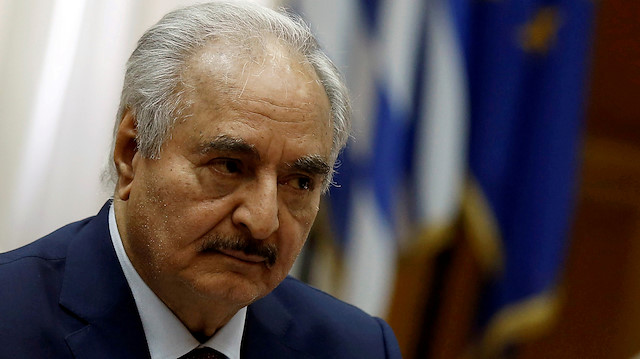
Libya’s renegade commander Khalifa Haftar's move to unilaterally declare himself as the ruler of the country is an attempt to cover his recent failures and would further strengthen the UN-recognized government, according to experts.
Nebahat Tanriverdi Yasar, a North Africa regional expert, said the recent week marked significant developments.
She said UN-recognized Government of National Accord’s (GNA) operations in the strategically important Al Watiya airbase dissipated support for Haftar.
She went on to say that demonstrations in Sirte city to support Saif al-Islam Gaddafi, son of late Libyan leader Muammar Gaddafi, could be a source of concern for Haftar.
In late 2019, pro-Gaddafi groups and tribes joined the Haftar bloc, but their loyalties seem to be changing.
She further noted that armed units in Zintan city are now supporting the GNA, in a shift of power balance in western Libya.
The Haftar side would also find itself in a difficult position on the Tarhuna front, she added.
Stressing that there were tensions between Haftar and Akile Salih, the parliament speaker of the Tobruk-based House of Representatives, she stated that Haftar's unilateral move also aimed at showing his strength to the groups in his circles.
The researcher said Haftar's "coup" came after his internal alliances became fragile, and his move sought to consolidate power and suppress the opposing voices.
The GNA will grow stronger on the field should the internal conflicts of the Haftar side deepen, she added.
- ‘Putschist and dictator’
Ahmet Uysal, head of the Middle East Strategic Studies Center (ORSAM) based in Ankara, said Haftar resorted to such a move due to his failed attempts to capture capital Tripoli, adding that the renegade commander acted with the mentality of a "putschist and dictator".
Stating that Haftar sought to establish a separate state with the support of Egypt, France, and the UAE, he continued: "...Haftar wants to divide Libya. The Tripoli government should not let this happen. If Libya is divided, the Arab world will become even more divided."
He went on to say that further division of Arabs would make them easier targets and regional stability would be adversely affected, making exploitation of Libyan resources easier by the foreign actors.
- Similarities with Egypt’s Sisi
Ali Semin, a Middle East expert, said the unilateral move of Haftar bore similarities with the coup of Egyptian President Abdel-Fattah al-Sisi.
According to Semin, Haftar's move is likely to fail and escalate the civil war in Libya.
He went on to say that the reaction of local and international powers would shape the destiny of Haftar and the region, adding the latter was unlikely to support the renegade commander.
"It is known that the critics in Tobruk government call for joining the GNA," he said, adding Haftar could have unilaterally declared himself president in a bid to prevent a difference of opinion within his ranks to grow stronger.
Haftar unilaterally declared himself the ruler of Libya on Monday, claiming that he "accepted the mandate of the Libyan people" and terming the Skhirat agreement of 2015 "a thing of the past."
Since the ouster of late ruler Muammar Gaddafi in 2011, two seats of power have emerged in Libya: Haftar in eastern Libya, supported mainly by Egypt and the United Arab Emirates, and the GNA in Tripoli, which enjoys the UN and international recognition.
Haftar’s self-proclaimed Libyan National Army (LNA) launched a failed offensive to take Tripoli last April, which caused bloodshed and suffering but stalled on the outskirts of the city.














